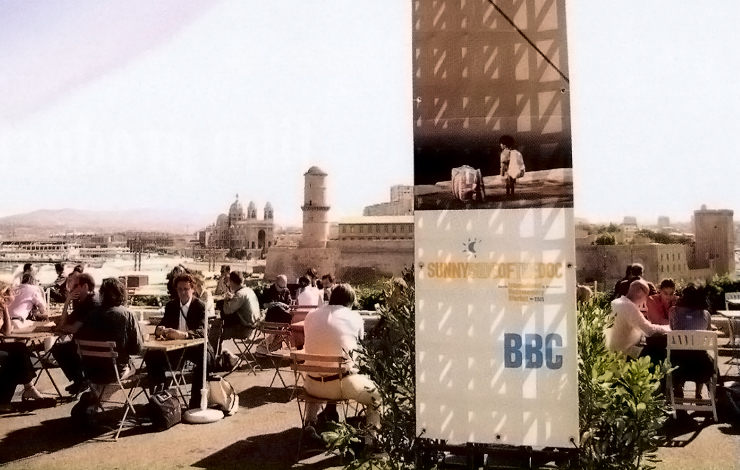
Sunny Side of the Doc (www.sunnysideofthedoc.com) took place last June in a magnificent former palace, high up on a hill overlooking Marseille, France. The view from the câfé terrace included a castle and a cathedral, with sailing boats darting about on an azure sea. It was an enlivening backdrop to a market dedicated solely to business. The strength of Sunny Side, unlike its competitors, is that it is attached to a film festival. It is purely concerned with buying and selling.
Sunny Side might be said to divide into three parts. There were the dozens of brightly decorated stands representing companies and organizations from around the world. There was the huge video library where buyers spent long days viewing. And there was a program of nearly 50 events, ranging from a Commissioning Editors Dinner through workshops like How To Pitch Your Film to a forum entitled Is It Still a Documentary?
US representation came in two forms. There were the big broadcasters like Discovery Communications, Sundance Channel and WGBH International looking to buy and co-produce in Europe. And there was also a group of filmmakers looking for sales or completion funding who shared a single stand under the banner of US Independents.
Meg Villarreal, executive director of US Independents, explained how her organization works: "What we do is provide an umbrella presence at markets in Europe like MIP and MIPCOM. We also work with the Banff Television Festival and the World Conferences of History Producers, Science Producers and Arts Producers. We help producers target the best commissioning editors so that they're not wasting their time or commissioning editors' time. We give them several international as well as US-based distribution agencies to talk to. We try and provide support for them in the often frightening first step that a producer has to take into the international marketplace."
Stand-sharer Meagan Kimball, who was looking for further funding for her film Blau Jeans, set in Germany, observed, "I'm actually a little disappointed. You come here thinking Europe is more open to artistic ideas, and you are faced with the same dilemma as you are in the American market. Everyone is very serious about commercial products."
Melody Gilbert, who was looking for sales for her film Whole, was more positive. "In America, we're so disconnected from the European market. My strategy is to walk around and talk to enough people and if they say ‘no,' I ask them to suggest somebody who might be interested. I'm not shy, and I think I've found a distributor."
Doug Block, founder of the online discussion group The D-word, said, "I'm looking for money, and the way to money is increasingly by finding co-producers who live in different parts of the world and have access to money from their area. It's been the theme of many of the panels here."
One panel that was especially helpful when it came to explaining the problems of funding and co-production was the Australian one. "It's like walking a tightrope," said moderator Dasha Ross. "The producers must balance the often competing interests of international broadcasters. Sometimes it means two quite different versions. When it comes to funding, don't approach us—the broadcasters—but make friends with our local producers because money must be channelled through an Australian company." A useful tip, since it probably applies to most countries.
Another notable panel was Financing Documentaries in the USA: Without a Broadcaster, Using Private and Public Funds, which was moderated by IDA's executive director, Sandra Ruch. On the panel to explain their policies were Melanie Wallace, senior series producer at NOVA/WGBH Boston, and Diane Weyermann, director of the documentary film program at the Sundance Institute, who emphasised the need "to imagine how you are going to get your film out to a significant international audience. You have to be able to articulate who might show it and why. However, we are open to all comers and you don't need to have a broadcaster."
Other useful workshops and forums included the National Film Board of Canada, which has a very positive policy towards co-production; a master class with David Grubin on how he set up and made his film on Napoleon; and an upbeat discussion on the different strategies for getting documentaries into cinema, as experienced by promoters in the Netherlands, Switzerland, England, Canada and the US.
Sunny Side is, above all, about access. The published information tells you who is present and what sort of films they are looking for, or wanting to sell. Monitors will even show you a picture of the person you are trying to contact. Pigeonholes are available for leaving messages, though most of the Americans I spoke to had wisely tried to prepare the ground by e-mailing requests for meetings. After that it seemed as though success depended very much on heeding the two words with which Ruch used when summarizing the message of her panel: "Be bold!"
For over 30 years, Henry Lewes has researched, written and directed documentaries for the BBC, CBC, Film Australia and the United Nations.
